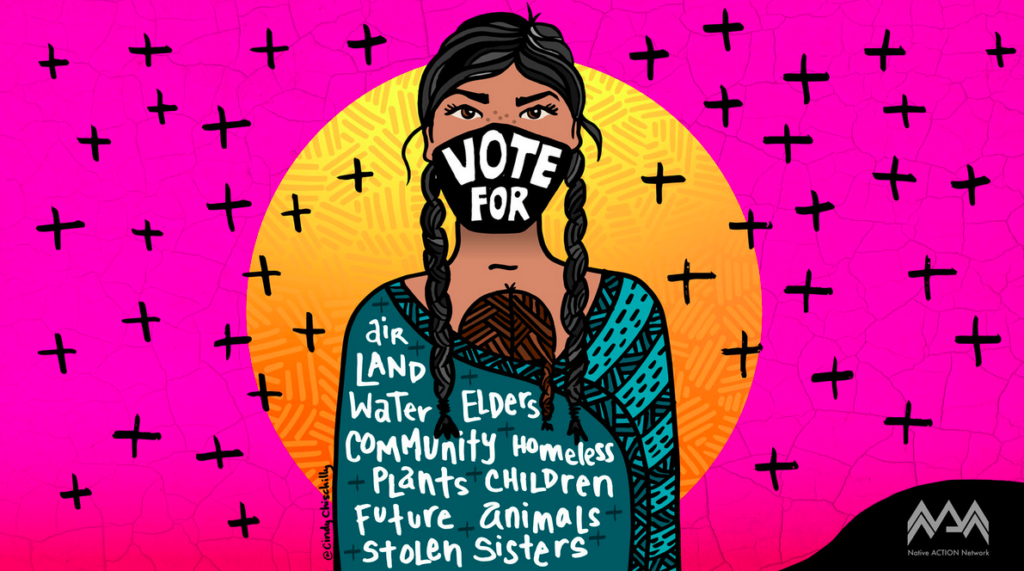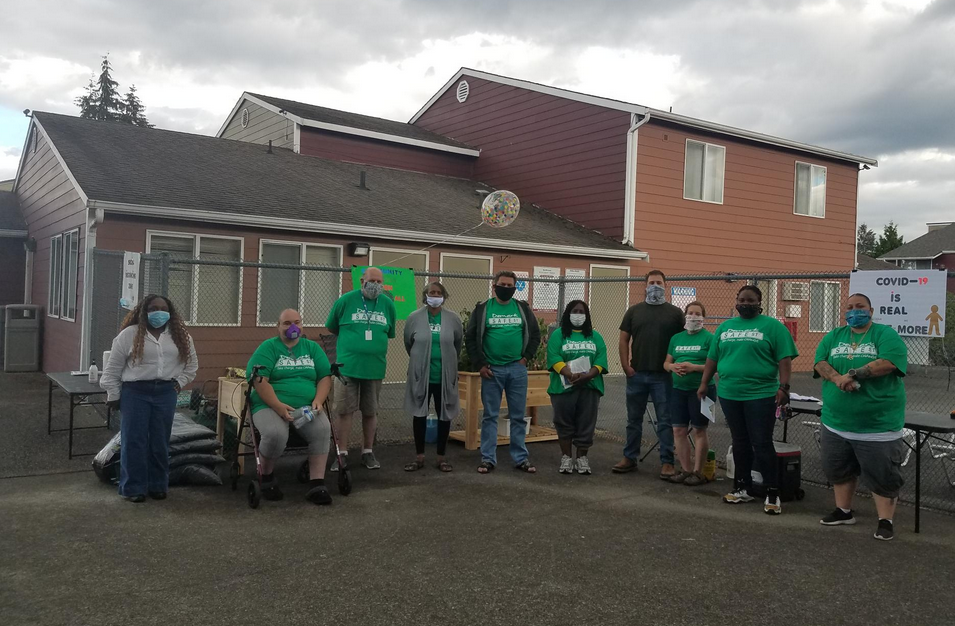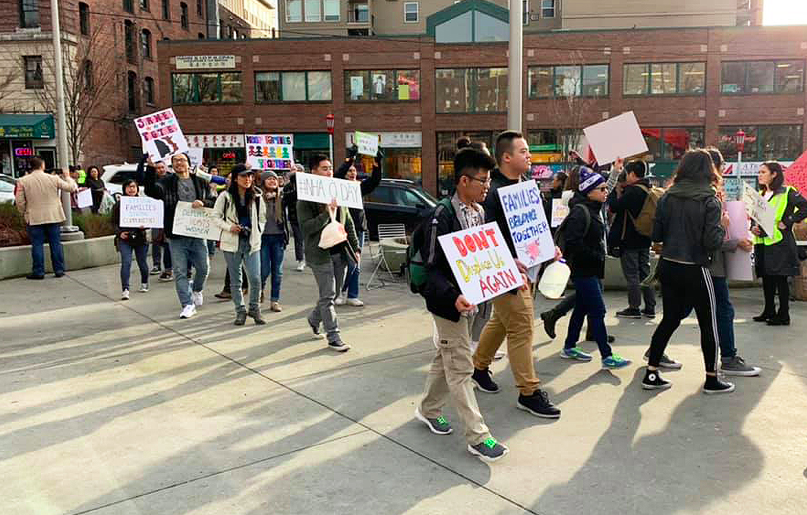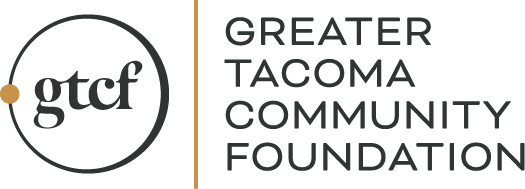
Community
12
Make Civic Engagement Personal To Make It Last

From paintings to beadwork, Tribal artists bridge past traditions with new traditions, like civic engagement and voting. Artist: Cindy Chischilly – Native ACTION Network
Jennifer Keating, Land Use Planner for Puyallup Tribe of Indians, and her family maintain a family tradition during election season, “My significant other and I, we’ve created a tradition with our blended families where we sit down with the campaign guide and the kids vote. They go through the guide and they compare, and they look at what each candidate has to offer, and they come up with why they chose this person. ‘I chose so-in-so because of their stance on climate change’, or whatever it happens to be. The kids are ‘voting’. It’s a tradition in our house now, so that when they grow up, it’s not an option that you vote, it’s your duty and that is how you were raised – to vote.”
“I understand how complex these situations are and how difficult it is to come to an understanding when everyone is so upset. Especially with the recent election.”
Jennifer didn’t always have the same drive towards civic engagement as she has today. Voting during the presidential elections was the extent of her engagement until she saw the issues her people faced through her work with the Puyallup Tribe of Indians, “All the things I assumed were recognized, acknowledged, and respected like Tribal Treaty Rights, Fishing Rights, Cultural Resource Protection, Tribal Sovereignty were not. It wasn’t until I started working in Planning and Land Use that I realized how horribly wrong I was.”
As a member of the 2020 Census Complete Count Committee, Jennifer developed and shared tools to increase census participation with her community under COVID-19 conditions. After the 2020 Census, Jennifer and other committee members continued meeting to share experience and knowledge with one another around ways to support continued civic engagement across diverse communities.
For the most recent election, Jennifer said the Puyallup Tribe of Indians adapted their approach, “Traditionally the Tribe would have done something as a big community, in-person with food and celebration. We are using our newspaper, mailers, and the schools are sending out messages to parents to re-evaluate tradition by voting. ‘Vote Like Your Ancestors Are Watching’, ‘Vote Because Your Ancestors Could Not’ and ‘Vote For Future Generations’.”
“Can I change the system? I already am in my own ways. Little by little, we have to demand change from our leaders.“

Safe Streets Campaign is committed to creating and supporting grassroots, community-led groups initiating positive change.
With the 2020 election completed, Jennifer and other members of the civic engagement cohort are encouraging their communities to find ways of staying engaged that fit and align with their cultures and values. A previous resident of Kentucky, cohort member Connor Shultz, Community Mobilization Specialist of Safe Streets, makes a point of seeking out and engaging people with different viewpoints, “I have come to understand how important it is to listen and listen well. I find opportunities to hear what is going on and understand where people are coming from. I have a hard time attacking positions in general, especially since I understand how complex these situations are and how difficult it is to come to an understanding when everyone is so upset. Especially with the recent election.”
“…it comes down to engagement and having dialogue around what it means to me, to us, and for my community. What matters to me and how do I support it? Only I can answer that.”
Dylan Tran, an alumnus of GTCF’s Youth Philanthropy Board, Senior Director of Education at Peace Community Center, draws on experiences during his time as a student activist at the University of Washington-Seattle. Learning more about his Southeast Asian heritage in ethnic studies courses, he began to connect his personal narrative of growing up in Tacoma with making a difference through grassroots organizing. “Once I started to understand my own story, I didn’t see it as a sad one anymore. Instead, I learned to draw strength and empowerment from it. Like, ‘we’re able to come from this, and still make it to the other side? And still push? And still demand a better future? Damn we are resilient.’ Can I change the system? I already am in my own ways. Little by little, we have to demand change from our leaders. That’s our right, and that’s what they signed up for.” Attending Tyree Scott Freedom School and participating with Youth Undoing Institutional Racism (YUIR) also helped Dylan grow in his community engagement.

Dylan (front-right) and friends exercise their right to protest at the Rally Against Deportation and Defend Vietnamese Refugees in Seattle, January 11, 2019.
“It is incredibly important to be civically engaged, especially to people of color and the Tribe. It’s about getting people to understand everything that is at stake.”
Continued investment in grassroots advocacy and civic engagement help to build and maintain representation and strong, thriving communities. At the same time, individuals can continue to make a positive difference by finding the avenues for civic engagement that they are able to sustain for the long-haul. Janece Levien, GTCF Senior Program Officer, observes the many different ways people are showing up in their communities, “From community partners leading voter registration efforts to signs in yards on the outskirts of Pierce County stating ‘Rural Americans Against Racism’, people are taking a stand for what they believe in. We have come so far and been through so much this year, I know that we will only continue to move forward.
“This year, I learned in community that it comes down to engagement and having dialogue around what it means to me, to us, and for my community. What matters to me and how do I support it? Only I can answer that.”
Finding your own approach to civic engagement involves choosing activities that are sustainable, rewarding, and culturally relevant to you. Jennifer Keating suggests the inspiration to staying involved comes from understanding how your community is affected by government decisions and priorities, “It is incredibly important to be civically engaged, especially to people of color and the Tribe. It’s about getting people to understand everything that is at stake. If people don’t honor or acknowledge protections such as Tribal Sovereignty, we have nothing. Our future is gone.”
In 2018, GTCF and the Pierce County Auditor’s Office partnered to organize the Pierce County Complete Count Committee, a collective of Pierce County organizations that recognized the importance of a complete and accurate census count for the well-being of our community – in 2020 and beyond. Through census work, GTCF also supported over 40 organizations through the Census Cohort with funding from the Office of Financial Management and convened this group three times over the course of six months. With suggestions and feedback from our community partners, GTCF has continued to meet monthly with members of the Census Cohort focused on the 2020 elections and civic engagement to identify what is at stake for our communities in Pierce County.

Members of the civic engagement cohort will be attending The People’s Gathering and will reflect on shared learning and experiences to further the dialogue around civic engagement.
Anyone can register for The People’s Gathering. REGISTRATION WILL CLOSE ON NOVEMBER 13, 2020 AT 5:00 pm.
Resources
Puyallup Tribe Of Indians
Native Women Vote
Safe Streets Campaign
Tyree Scott Freedom School
Youth Undoing Institutional Racism (YUIR)
The People’s Gathering
